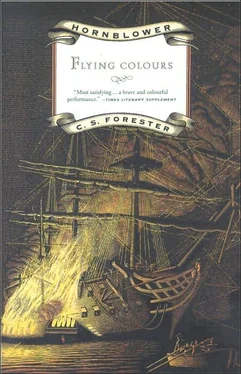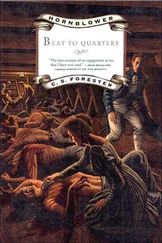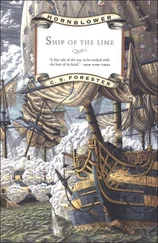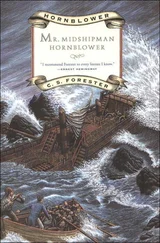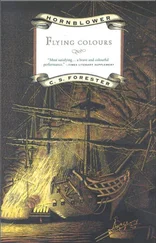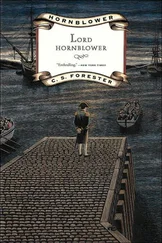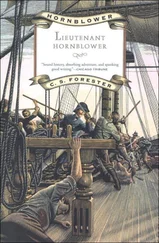Cecil Forester - Flying Colours
Здесь есть возможность читать онлайн «Cecil Forester - Flying Colours» весь текст электронной книги совершенно бесплатно (целиком полную версию без сокращений). В некоторых случаях можно слушать аудио, скачать через торрент в формате fb2 и присутствует краткое содержание. Год выпуска: 1989, ISBN: 1989, Издательство: Back Bay Books, Жанр: Исторические приключения, Путешествия и география, Морские приключения, на английском языке. Описание произведения, (предисловие) а так же отзывы посетителей доступны на портале библиотеки ЛибКат.
- Название:Flying Colours
- Автор:
- Издательство:Back Bay Books
- Жанр:
- Год:1989
- ISBN:0316289396
- Рейтинг книги:5 / 5. Голосов: 1
-
Избранное:Добавить в избранное
- Отзывы:
-
Ваша оценка:
- 100
- 1
- 2
- 3
- 4
- 5
Flying Colours: краткое содержание, описание и аннотация
Предлагаем к чтению аннотацию, описание, краткое содержание или предисловие (зависит от того, что написал сам автор книги «Flying Colours»). Если вы не нашли необходимую информацию о книге — напишите в комментариях, мы постараемся отыскать её.
Flying Colours — читать онлайн бесплатно полную книгу (весь текст) целиком
Ниже представлен текст книги, разбитый по страницам. Система сохранения места последней прочитанной страницы, позволяет с удобством читать онлайн бесплатно книгу «Flying Colours», без необходимости каждый раз заново искать на чём Вы остановились. Поставьте закладку, и сможете в любой момент перейти на страницу, на которой закончили чтение.
Интервал:
Закладка:
Cecil S. Forester
Flying Colours
Chapter One
Captain Hornblower was walking up and down along the sector of the ramparts of Rosas, delimited by two sentries with loaded muskets, which the commandant had granted him for exercise. Overhead shone the bright autumn sun of the Mediterranean, hanging in a blue Mediterranean sky and shining on the Mediterranean blue of Rosas Bay—the blue water fringed with white where the little waves broke against the shore of golden sand and grey-green cliff. Black against the sun above his head there flapped the tricolour flag of France, proclaiming to the world that Rosas was in the hands of the French, that Captain Hornblower was a prisoner. Not half a mile from where he walked lay the dismasted wreck of his ship the Sutherland, beached to prevent her from sinking, and in line beyond her there swung at their anchors the four ships of the line which had fought her. Hornblower, narrowing his eyes and with a twinge of regret for his lost telescope could see even at that distance that they were not ready for sea again, nor were likely to be. Even the two-decker which had emerged from the fight with all her masts intact still had her pumps at work every two hours to keep her afloat, and the other three had not yet succeeded in setting up masts to replace the ones lost in the battle. The French were a lubberly lot of no-seamen, as might be expected after seventeen years of defeat at sea and six of continuous blockade.
They had been all honey to him, in their French fashion praising him for his ‘glorious defence’ after his ‘bold initiative’ in dashing in with his ship to interpose between their four and their refuge at Rosas. They had expressed the liveliest pleasure at discovering that he had miraculously emerged unhurt from a battle which had left two-thirds of his men killed and wounded. But they had plundered in the fashion which had made the armed forces of the Empire hated throughout Europe. They had searched the pockets even of the wounded who had cumbered the Sutherland’s decks in moaning heaps. Their admiral, on his first encounter with Hornblower, had expressed surprise that the latter was not wearing the sword which the admiral had sent back to him in recognition of his gallantry, and on Hornblower’s denial that he had ever seen the weapon again after giving it up had instituted a search which discovered the sword cast aside somewhere in his flagship, the glorious inscription still engraved upon the blade, but with the gold stripped from hilt and guard and scabbard. And the admiral had merely laughed at that and had not dreamed of instituting a search for the thief; the Patriotic Fund’s gift still hung at Hornblower’s side, the tang of the blade protruding nakedly from the scabbard without the gold and ivory and seed pearls which had adorned it.
The French soldiers and sailors which had swarmed over the captured ship had torn away even the brasswork in the same fashion; they had gorged upon the unappetizing provisions in a way which proved how miserable were the rations provided for the men who fought for the Empire—but it was only a few who had swilled themselves into insensibility from the rum casks. In face of similar temptation (to which no British officer would have exposed his men) British seamen would have drunk until nine-tenths of them were incapable or fighting mad. The French officers had made the usual appeal to their prisoners to join the French ranks, making the usual tempting offers of good treatment and regular pay to anyone who cared to enlist either in the army or the navy. Hornblower was proud that no single man had succumbed to the temptation.
As a consequence the few sound men now languished in strict confinement in one of the empty storerooms of the fortress, deprived of the tobacco and rum and fresh air which for most of them represented the difference between heaven and hell. The wounded—the hundred and forty-five wounded—were rotting in a dank casemate where gangrene and fever would soon make an end of them. To the logical French mind the poverty-stricken Army of Catalonia, which could do little even for its own wounded, would be mad to expend any of its resources on attention to wounded who would be intolerable nuisances should they survive.
A little moan escaped Hornblower’s lips as he paced the ramparts. He had a room of his own, a servant to wait on him, fresh air and sunshine, while the poor devils he had commanded were suffering all the miseries of confinement—even the three or four other unwounded officers were lodged in the town gaol. True, he suspected that he was being reserved for another fate. During those glorious days when, in command of the Sutherland, he had won for himself, unknowing, the nickname of ‘the Terror of the Mediterranean’, he had managed to storm the battery at Llanza by bringing his ship up close to it flying the tricolour flag. That had been a legitimate ruse de guerre for which historical precedents without number could be quoted, but the French government had apparently deemed it a violation of the laws of war. The next convoy to France or Barcelona would bear him with it as a prisoner to be tried by a military commission. Bonaparte was quite capable of shooting him, both from personal rancour and as a proof of the most convincing sort to Europe of British duplicity and wickedness, and during the last day or two Hornblower thought he had read as much in the eyes of his gaolers.
Just enough time had elapsed for the news of the Sutherland’s capture to have reached Paris and for Bonaparte’s subsequent orders to have been transmitted to Rosas. The Moniteur Universel would have blazed out in a paean of triumph, declaring to the Continent that this loss of a ship of the line was clear proof that England was tottering to her fall like ancient Carthage; in a month or two’s time presumably there would be another announcement to the effect that a traitorous servant of perfidious Albion had met his just deserts against a wall in Vincennes or Montjuich.
Hornblower cleared his throat nervously as he walked; he expected to feel afraid and was surprised that he did not. The thought of an abrupt and inevitable end of that sort did not alarm him as much as did his shapeless imaginings when he was going into action on his quarterdeck. In fact he could almost view it with relief, as putting an end to his worries about his wife Maria whom he had left pregnant, and to his jealous torments of longing for Lady Barbara who had married his admiral; in the eyes of England he would be regarded as a martyr whose widow deserved a pension. It would be an honourable end, then, which a man ought to welcome—especially a man like Hornblower whose persistent and unfounded disbelief in his own capacity left him continually frightened of professional disgrace and ruin.
And it would be an end of captivity, too. Hornblower had been a prisoner once before, for two heartbreaking years in Ferrol, but with the passing of time he had forgotten the misery of it until his new experience. In those days, too, he had never known the freedom of his own quarterdeck, and had never tasted the unbounded liberty—the widest freedom on earth—of being a captain of a ship. It was torture now to be a prisoner, even with the liberty to look upon the sky and the sea. A caged lion must fret behind his bars in the same way as Hornblower fretted against his confinement. He felt suddenly sick and ill through restraint. He clenched his fists and only by an effort prevented himself from raising them above his head in a gesture of despair.
Then he took hold of himself again, with an inward sneer at his childish weakness. To distract himself he looked out again to the blue sea which he loved, the row of black cormorants silhouetted against the grey cliff, the gulls wheeling against the blue sky. Five miles out he could see the topsails of His Majesty’s frigate Cassandra keeping sleepless watch over the four French ships huddled for shelter under the guns of Rosas, and beyond them he could see the royals of the Pluto and the Caligula –Admiral Leighton, the unworthy husband of his beloved Lady Barbara, was flying his flag in the Pluto, but he refused to let that thought worry him—where they awaited an accession of strength from the Mediterranean fleet before coming in to destroy the ships which had captured him. He could rely upon the British to avenge his defeat. Martin, the vice-admiral with the Toulon blockading squadron, would see to it that Leighton did not make a hash of this attack, powerful as might be the guns of Rosas.
Читать дальшеИнтервал:
Закладка:
Похожие книги на «Flying Colours»
Представляем Вашему вниманию похожие книги на «Flying Colours» списком для выбора. Мы отобрали схожую по названию и смыслу литературу в надежде предоставить читателям больше вариантов отыскать новые, интересные, ещё непрочитанные произведения.
Обсуждение, отзывы о книге «Flying Colours» и просто собственные мнения читателей. Оставьте ваши комментарии, напишите, что Вы думаете о произведении, его смысле или главных героях. Укажите что конкретно понравилось, а что нет, и почему Вы так считаете.
